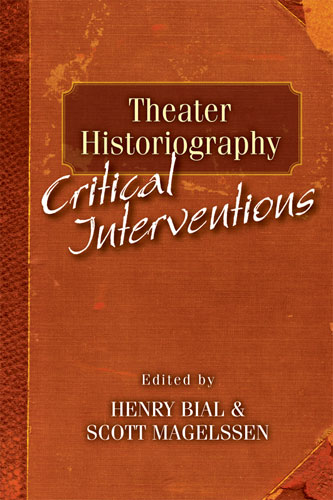ABOUT THE BOOK
Theater Historiography: Critical Interventions
Henry Bial and Scott Magelssen, editors
Theater historiography means the study of the foundational assumptions, principles, and methodologies that determine how theater history is written. To practice theater historiography means to look beyond the record of “what happened” to analyze how and why such records are constructed. Thus we might say that theater historiography is to theater history as physics is to engineering or economics is to business; the fundamental theories and hypotheses from which all subsequent decisions flow. Compared to those other disciplines, however, theater historiography has come late to the party. It is only in the last thirty years or so that theater scholars have paid critical attention to how theater history is written, and many if not most theater history textbooks give the subject scant attention… or no attention at all.
The conversations and debates about theater historiography have been playing out in the spaces where we come together to share our work: in books and articles, in conference sessions, and in our seminar rooms. The discussion gets kicked up a notch in Theater Historiography: Critical Interventions, in which twenty-three scholars come together to answer what they find to be the critical questions facing theater historiography today, each drawing on their specific area of expertise and methodologies from theater history and performance studies. In the pages of TH:CI contributors probe key issues about interdisciplinarity, postcolonialism, the archive, digital technology, and the very political, economic, and discursive forces that structure our discipline. The goal of Theater Historiography, The Website is to extend and broaden the lively conversations the book initiates and to invite others to join those conversations… and start new ones.
With the launch of the website in 2011, we also launched our first featured series of blog posts from contributors to Theater Historiography: Critical Interventions. Each month we asked a featured author what they were thinking (WWIT?) when we asked her or him to address a “critical” question facing those who practice theater historiography today. Since January 2012, invited guest bloggers have been sharing their thinking about our profession and our work today.
“Theater Historiography: Critical Interventions is an important collection. The essays on theater history are models of meticulous research engaged through rigorous theorizing and analysis; they often yield striking new insights into subjects we might think we already know well. Other essays provide new perspectives on how to approach theater and performance, and are passionate calls to reconsider how we engage objects of study. The larger cultural contexts and analyses in the section ‘Theater History’s Discipline’ should prove invaluable for furthering important conversations about the field.”
—Rhonda Blair, Southern Methodist University
“In this exciting collection, theater historiography becomes a veritable hotbed in which theater history and performance studies productively, even seamlessly, intertwine. These richly diverse yet cogently edited essays incisively address the dynamic methodological, political, and pedagogical challenges of reading past performances in the present. Contributors honor their teachers with fresh interventions and a critically engaged passion for doing theater history that will inspire both established and emerging generations of scholars.”
—Kim Marra, University of Iowa
“Redraws ‘theater history’ in fiercely imaginative, inspired, and provocative ways.”
—Harley Erdman, University of Massachusetts
“A major collection that brings together new voices in the field . . . its range and breadth are impressive, and its usefulness in the classroom undeniable.”
—Ric Knowles, University of Guelph
Henry Bial is Professor and Chair of the Department of Theatre and Dance and Co-Director of the School of the Arts at the University of Kansas.
Scott Magelssen is Associate Professor of Theatre and Performance Studies at the University of Washington.

